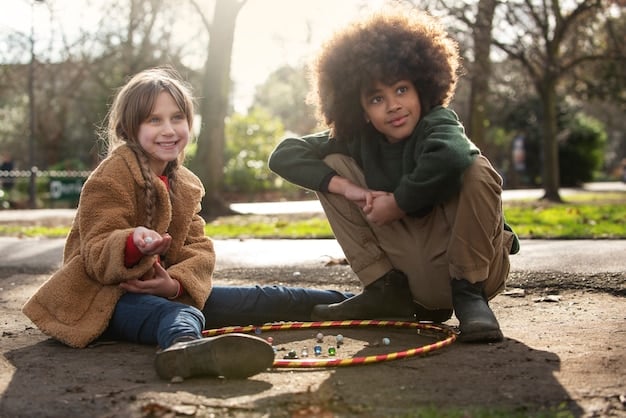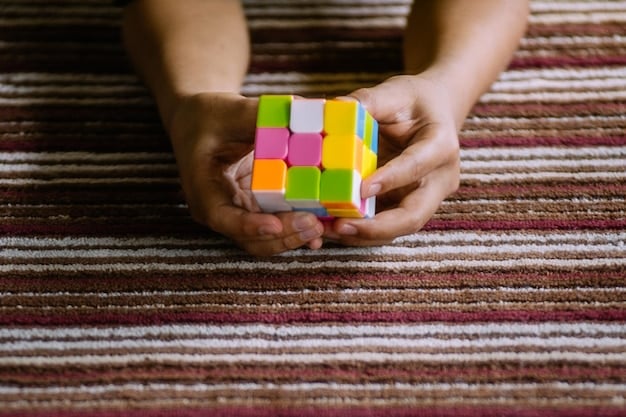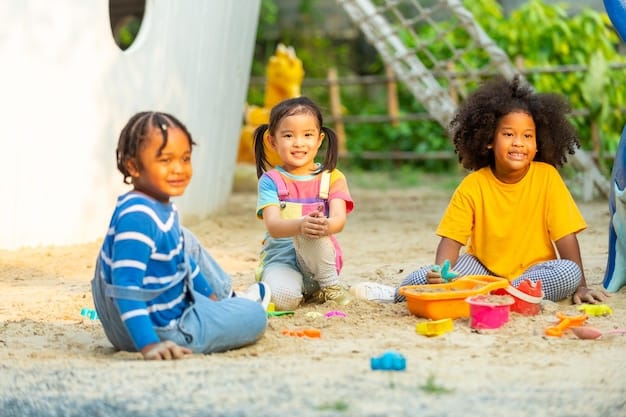The Importance of Unstructured Play: Boosting Creativity & Development

Unstructured play, or free time, is crucial for children’s development, fostering creativity, problem-solving skills, and social-emotional growth by allowing them to explore, experiment, and learn at their own pace.
In today’s structured world, it’s easy to overlook the importance of unstructured play: how free time boosts creativity and development. But giving children the space and time to play freely is one of the best investments you can make in their future, fostering essential life skills and sparking their innate curiosity.
Understanding Unstructured Play
Unstructured play is child-directed activity where children choose what to do, how to do it, and who to do it with. Unlike structured activities like sports or music lessons, there are no set rules, goals, or adult-imposed agendas. This freedom allows children to explore their interests, experiment with ideas, and develop their unique perspectives.
Think of it as the opposite of a scheduled activity. It’s the time when a child can simply be, dream, and create without external pressures or expectations. This type of play can take many forms, from imaginative games to building with blocks to simply wandering around in nature.
Key Characteristics of Unstructured Play
Several key characteristics define unstructured play, setting it apart from more organized activities and highlighting its unique developmental benefits.
- Child-Led: Children are in control of the activity.
- No Set Rules: There are no pre-determined rules or objectives.
- Process-Oriented: The focus is on the experience and exploration, not on achieving a specific outcome.
- Flexible and Adaptable: Children can change the game, rules, or focus as they go.
By understanding these characteristics, parents can appreciate the distinctive value of unstructured play and its potential to foster creativity, problem-solving skills, and social-emotional development in children.

Cognitive Benefits of Unstructured Play
Unstructured play isn’t just fun; it’s a powerful tool for cognitive development. When children are free to explore and experiment, they’re actively engaging their brains in ways that promote critical thinking, problem-solving, and creativity.
By allowing children to lead the play, we give them opportunities to develop their cognitive abilities in a natural and engaging way. They learn to think critically, solve problems creatively, and adapt to new situations, all while having fun.
Problem-Solving Skills
Unstructured play provides countless opportunities for children to develop problem-solving skills. Whether they’re trying to build a tower that won’t topple over or figuring out how to share toys with a friend, they’re constantly faced with challenges that require them to think critically and creatively.
Boosting Creativity and Imagination
Imagination takes center stage during unstructured play. Children create their own worlds, stories, and roles, which stimulates their creativity and allows them to think outside the box. Without pre-set rules, they are free to invent, experiment, and explore possibilities, helping them to think creatively and develop their unique perspectives.
In conclusion, unstructured play is not just about fun and games; it’s a crucial element in nurturing cognitive development. By giving children the freedom to explore, experiment, and create, parents and educators can foster essential cognitive skills that will benefit them throughout their lives.
Social and Emotional Development
Beyond cognitive skills, unstructured play significantly contributes to a child’s social and emotional growth. In free play, children learn to navigate social interactions, manage their emotions, and develop empathy, all essential for building healthy relationships and succeeding in life.
Allowing children the space for unstructured play can lead to positive interactions and the construction of essential life skills. They learn about teamwork, compassion and how to resolve conflict in a peacable manner.

Learning Social Skills
Unstructured play is a training ground for social skills. Children learn how to cooperate, negotiate, and compromise as they play with others. They discover how to share toys, take turns, and resolve conflicts in a respectful manner. These social interactions help them develop empathy and understand different perspectives.
Cooperation can come in many forms. Sometimes it’s building a castle together, other times it’s creating a new universe where everyone can be a hero. In these playful interactions, children learn empathy and how to negotiate different views. A child learns quickly that compromise can lead to more enjoyable outcomes when they are collaborating with their peers.
Developing Emotional Regulation
Unstructured play also helps children develop emotional regulation skills. They learn how to manage their feelings, express themselves appropriately, and cope with frustration or disappointment. Whether they’re dealing with losing a game or not getting their way, these experiences help them build resilience and develop emotional intelligence.
- Empathy: Developing an understanding of how other children are feeling will help to build a caring nature.
- Self-Awareness: A better understanding of their own emotion and how to express them in a healthy way.
- Resilience: Learning how to bounce back from disappointment and challenges improves their long-term wellbeing.
In summary, unstructured play is a fundamental factor in the social and emotional progress of children. Offering opportunities assists them in developing the required skills for relationship-building, emotional management and overall wellbeing.
The Role of Parents and Caregivers
Parents and caregivers play a crucial role in creating opportunities for unstructured play. While the play itself should be child-led, adults can facilitate the process by providing a safe and stimulating environment, offering encouragement, and stepping back to allow children to explore on their own.
As a parent, resist over scheduling activities. It will reduce a child’s ability to creatively explore. Finding the right balance between organized and free time is key to fostering a child’s intellectual and emotional wellbeing.
Creating a Play-Friendly Environment
One of the most important things parents can do is to create a play-friendly environment. This means providing children with access to a variety of materials and resources that inspire creativity and imagination. It could be as simple as a box of dress-up clothes, a collection of art supplies, or a backyard with plenty of space to run and explore.
Resisting the Urge to Intervene
It can be tempting for parents to intervene in their children’s play, especially if they see them struggling or making mistakes. However, it’s important to resist this urge and allow children to work things out on their own. By stepping back, parents give children the opportunity to develop problem-solving skills, build resilience, and learn from their experiences.
- Allow for Independence: Children learn better when they are able to find the answer themselves.
- Provide Encouragement: Help children overcome their challenges with positivity.
- Learn to Stand Back: Let children grow naturally without intervening needlessly.
By creating a play-friendly environment, resisting the urge to intervene, and offering support and encouragement, parents can help their children reap the full benefits of unstructured play, fostering essential skills and nurturing their natural curiosity.
Overcoming Obstacles
Despite the numerous benefits of unstructured play, many parents find it challenging to incorporate into their children’s lives. Common obstacles include busy schedules, safety concerns, and the allure of technology. However, with a little planning and creativity, these challenges can be overcome.
There is less time for free play due to busy schedules, parents worried about safety and the fascination with technology but with planning, these obstacles can be overcome.
Managing Screen Time Effectively
In today’s digital age, it’s easy for children to spend hours glued to screens. While technology can be a valuable tool, it’s important to manage screen time effectively and ensure that children have plenty of opportunities for unstructured play. Set limits on screen time and encourage children to engage in other activities, such as reading, playing outdoors, or pursuing hobbies. This shift can allow children to experience a balanced development of skills.
Addressing Safety Concerns
Safety is a top priority for most parents, and it’s natural to be concerned about letting children play unsupervised. However, there are steps you can take to minimize risks and create a safe play environment. Choose safe play areas, provide appropriate supervision, and teach children about safety rules and boundaries.
Taking steps to create a safer playtime environment will help address concerns. These steps include selecting appropriate toys and ensuring the surrounding areas are free from physical risk. Teaching a child about boundaries can help build trust and independence.
Finding Time in a Busy Schedule
Many families struggle to find time for unstructured play in their busy schedules. However, even small pockets of free time can make a big difference. Look for opportunities to incorporate unstructured play into your daily routine, such as spending time outdoors after school or setting aside a few minutes each evening for imaginative games.
In conclusion, even though issues such as screen time, safety concerns and time constraints can make it difficult, with a little planning and creativity they can be easily navigated.
Examples of Unstructured Play Activities
Unstructured play can incorporate a wide range of activities. The key is to let the child take the direction and facilitate the world that they are living in at that time.
Whether it is playing outdoors or indoors, letting the child take lead will help boost creativity and development.
- Building Forts: Children can use blankets, pillows, chairs, and other household items to create their own secret hideaways.
- Playing Dress-Up: Dress-up encourages children to explore different roles and identities, enhancing their imagination and understanding of the world.
- Outdoor Exploration: Children discover and interact with the natural world by exploring parks and playgrounds.
- Arts and Crafts: Providing materials and guiding imagination promotes creativity and self-expression through art.
The Long-Term Benefits
The benefits of unstructured play extend far beyond childhood. Children who engage in regular unstructured play are more likely to develop into creative, resilient, and well-adjusted adults.
Freeplay offers many advantages that last into adulthood and influence how kids learn, problem-solve, and engage with others.
Enhanced Creativity and Innovation
Creativity is a valuable asset in today’s rapidly changing world. Unstructured play helps children develop the ability to think outside the box, come up with innovative solutions, and adapt to new situations. These skills can benefit them in their future careers and personal lives.
Improved Mental Health and Well-being
Unstructured play is also linked to improved mental health and well-being. Children who have opportunities to play freely are less likely to experience stress, anxiety, and depression. Play provides an outlet for emotions, promotes relaxation, and fosters a sense of joy and fulfillment.
- Reduced Stress: Allows children to unwind and be free from everyday stress.
- Emotional Resilience: Learning to express and manage emotions through play.
- Improved Social Skills: Helping children feel more connected with others.
In summary, unstructured play offers long-term advantages such as better problem-solving skills and emotional stability, as well as fostering creativity. These abilities contribute to a happy and successful life overall. Prioritizing unstructured play will assist kids in reaching their full potential and living rich, significant lives.
| Key Area | Brief Description |
|---|---|
| 🎨 Creativity | Unstructured play increases innovation and creative thinking. |
| 🤝 Social Skills | Children learn to negotiate, co-operate, and understand empathy. |
| 🧠 Cognitive Development | Improves problem-solving skills and critical thinking ability. |
| 💪 Resilience | By navigating play challenges, children become more emotionally resilient. |
Frequently Asked Questions
▼
Unstructured play is child-led play that has no set rules, expectations, or goals. It allows children to explore, create, and discover independently without the direction or interference of adults, fueling their natural curiosity.
▼
It significantly contributes to their social, emotional, and cognitive development. It boosts creativity, enhances problem-solving skills, improves emotional resilience, and teaches effective social skills through peer interaction.
▼
Parents can set up play-friendly environments and allow more open time for play. Offer materials that spark creativity and reduce screen time, also letting children figure things alone without intervention or over-scheduling activities.
▼
By choosing secure settings for kids to play, providing the right amount of supervision dependent on the child’s age, and teaching safety rules and limits at an early age, safety concerns can be successfully handled.
▼
Indeed, there are. Teens could benefit from creative writing, playing a sport where there aren’t imposed rules in place, learning a musical art, volunteering, or getting involved in personal projects that foster independence and innovation.
Conclusion
Prioritizing unstructured play is not just about having fun; it’s about investing in your child’s future. By fostering creativity, problem-solving skills, social-emotional development, and overall well-being, unstructured play empowers children to thrive in a complex world. So, let’s embrace the power of free time and give our children the gift of play.





